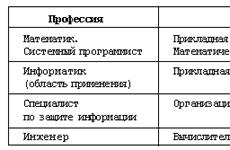National Research University Higher School of Economics (NRU HSE). National Research University Higher School of Economics (NRU HSE) Higher School of Economics
Master's program at the National Research University Higher School of Economics search for a direction, program, university, form of education. Master budget. Database of Masters in Russia.
National research university The Higher School of Economics NRU HSE is one of the largest leading universities in the Russian Federation. Today HSE has opened 28 master's programs in 100 master's programs. It is possible to study at the HSE master’s program on a budget (note that among the universities of the Russian Federation, the number of state-funded places in the HSE master’s program is the highest).
About 20,000 students study at the university, including 3,930 master's students from the National Research University Higher School of Economics, 587 postgraduate students. The Higher School of Economics has three campuses: in Perm, Nizhny Novgorod and St. Petersburg.
The main profiles of the university are humanitarian, socio-economic, physical and mathematical, natural, social and other sciences. This university has more than 20 faculties and various departments.
Opportunities for HSE students
As part of the international activities of the Higher School of Economics (more than 130 international partners), master's graduates have the opportunity to receive a diploma best universities Europe. At some faculties, disciplines are read in English.
Higher School of Economics is distinguished by the transparency and openness of the hosting company, as well as financial activities. As studies by independent rating agencies have shown, HSE graduates have the highest salaries in the Russian Federation.
A bit of history
In 2012, the Moscow State University became part of the Higher School of Economics. Institute of Mathematics and Electronics, as well as 2 institutions of professional additional education.
In 2011, the National Research University Higher School of Economics was awarded the status of a National Research University.
In 2010, for the first time in the Russian Federation, an academic postgraduate program was opened at the Higher School of Economics.
Since 2008, the Higher School of Economics has been under the jurisdiction of the Government of Russia.
Specialists in this field develop technologies for solving not only purely mathematical and informational problems, but also for managing complex technical objects.
The megafaculty prepares personnel for the fastest growing technology industries. Here they teach how to assemble complex technical systems: make a “smart house” out of an ordinary apartment, assemble a household robot or design an industrial robotic arm, program an intelligent self-tuning control system, or even build differential correction stations for satellite navigation. ITMO University graduates work in high-tech companies that develop IT systems, IoT technologies, and manufacture robots and equipment.
megafaculty of translational information technologies
The field of IT is undoubtedly one of the highest priorities for the development of science and technology. Technologies XXI century, often referred to as the Information Age. Thanks to Russian specialists in the field information technologies, Russia, along with China and the United States, has become one of the three key countries in which the Internet industry and software development are concentrated. In spite of economic crisis The IT market is growing by 15-20% annually.
High competencies in the field of IT are a kind of “visiting card” of ITMO University, whose students take first places in the most difficult Russian and world programming competitions. The championship in the most prestigious of these Olympiads, ACM ICPC, has already belonged to ITMO University seven times, and university graduates work in the best IT companies and start their own.
megafaculty of photonics
This mega-school is designed for those who want to be not just at the forefront of science, but one step ahead of it. Today, 10% of the world's electricity is spent running and maintaining the Internet infrastructure - the amount of electricity consumed by servers and data centers doubles every 4 years, and the amount of information transmitted over the past 10 years has increased 50 times. These numbers will grow steadily because as opportunities increase, so do needs, but the old technologies based on electricity are unlikely to fully meet the demands of the 21st century. Photonics and optoinformatics, advanced branches of science and technology related to the use and processing of light radiation and optical signals, will help to correct the situation.
megafaculty of biotechnology and low-temperature systems
Within the framework of the mega-faculty, training is also provided in other important areas, such as refrigeration and cryogenic technology, the creation and maintenance of climate technology, air conditioning, environmental protection and environment. For example, the "cold" of Olympic Sochi was created by graduates and students of ITMO University. High level their competencies are in demand in leading companies in Russia and the world, including Daikin, Bitzer, The Linde Group, Danone, Coca-Cola, Baltika and many others.
Until July 15, the Higher School of Economics is accepting documents for full-time master's programs. The university offers 112 programs in 28 areas. The variety of programs is just one of the reasons to choose HSE to study.
1. The largest budget enrollment for master's programs among Russian universities.
Education in the HSE master's program is possible both on a budgetary and commercial basis. In 2015, 2557 state-funded and 915 paid places are waiting for applicants.
On the HSE Moscow campus, you can apply for only one master's program, but in branches you can apply for several at once (in accordance with the rules for admission to a master's program at the corresponding branch).
2. Opportunity to get a new specialty for free.
Regardless of what you studied in the undergraduate degree, you can change the direction of study and master a new specialty. This is one of the key advantages of the "4 + 2" system (bachelor's + master's). At the same time, a new specialty can be obtained completely free of charge by enrolling in a budget place. With the second higher education it won't work, you'll have to pay for it anyway.
3. The most demanded specializations by employers.
Master's students receive a fundamental education, as well as practical knowledge and skills. Not only outstanding scientists teach at HSE, but also practitioners - representatives of business and government, who may become your future employers.
HSE University has several joint programs with Russian and foreign companies, and basic departments have been opened. Master's students often find work while still studying. According to surveys by the HSE Center for Internal Monitoring, more than 60% of Master's students are already employed in their second year. work in government departments, public organizations, major Russian and foreign companies, create their own successful business, build a scientific career.
4. Opportunity to study in English.
This year, HSE is recruiting for 17 English-taught programs. In addition, the share of courses taught in English in Russian-language programs increased by 25% compared to last year. Obviously, studying in English makes it as easy as possible to build a further international career - both in business and in science.
5. Participation in international student mobility programs: double diplomas, internships, exchange programs.
HSE study programs are recognized by dozens of leading foreign universities. Master's students can participate in cross-education programs and student exchanges. Also, many programs have agreements on double diplomas. For information about international programs at the faculties, see.
6. Preparatory programs for applicants.
The HSE has the following opportunities to prepare for admission to the master's program:
Most master's programs provide two entrance tests: in the specialty and in English language(on some programs, you can select a different language).
Entrance examinations in the specialty can take the form of an oral or written exam or portfolio review. The language exam is graded on a pass/fail basis. Can you provide admission committee a language certificate from the list approved by the National Research University Higher School of Economics. This will prevent you from taking the exam.
8. Equal opportunities for admission for graduates of any Russian universities.
More than 50% of HSE master's students have previously graduated from other universities, including regional ones.
All applicants have absolutely equal chances for admission, regardless of where they studied before. Everyone surrenders entry exams On a general basis, HSE graduates have no advantages. Moreover, HSE is interested in attracting bachelors and specialists who have graduated from other universities.
9. Discounts and credit on special terms for studying at paid places.
If you didn’t get enough points for admission to the budget, from the second year you have the opportunity to get a discount on tuition fees (this does not apply to fully paid programs). For more information about paid programs and discounts, see .
Also on paid places you can use a special educational loan.
10. Simplified admission system for graduates from foreign universities.
If you graduated from a university outside of Russia, now you can certify your diploma not only at Rosobrnadzor, but also directly at the Higher School of Economics. An application for the recognition of a document of education issued by a foreign country can be submitted online. More about admission foreign citizens cm. .
11. Guarantee of a place in a hostel for non-resident students
All non-resident students (except for those living up to the 8th zone from Moscow in the directions of movement railway transport), who entered the magistracy both for budgetary and paid education, are guaranteed a place in the hostel. HSE has 7 dormitories.
The hostel is also provided during the entrance exams.
12. Scholarships for students on budget education
The scholarship is paid to all students who entered the budget department. In the future, the size of the scholarship is determined by the student's academic performance.
Sergei Roshchin, HSE Vice-RectorBy the academic year 2015/16, we have modernized our master's program. For example, the program " The history of artistic culture and the art market” has become budgetary since this year. Appeared new program in Computer Science - " Mathematical methods of optimization and stochastics» . The range of legal programs has also expanded: we are starting to train lawyers in the field of sports. In addition, this year, for the first time, admission will be held for both the master's and bachelor's programs. Foreign languages and intercultural communication". When we participated in educational exhibitions, there were a lot of questions from visitors about this particular program: they were interested in the conditions of education, the content of the program. Five new specializations opened on master's program"Design", including the production of games and applications.
HSE takes the quality of education seriously. Five HSE master's programs have been professionally and publicly accredited by the Quality Control Agency for Education and Career Development and the Association of Russian Managers. These are the programs Management of research, development and innovation in the company”, “Project Management: Project Analysis”, “Human Resource Management”, “Electronic Business”, “Management in the Media”. All of them are somehow related to management and business, although they belong to different areas of training.
The first-year students took the oath of a Moscow student, in which they promised to be active citizens of the capital and spare no effort and time for studying.17.09.2019 Moscow State University of Management
in the Moscow state university food industries began to work seminars "How to choose your education program" dedicated to determining the educational trajectory at any age.
09/17/2019 MGUPP A series of free educational workshops for schoolchildren federal project"Equal Opportunities for Children" starts at the Babushkinsky Park in late September.
17.09.2019
Losinoostrovsky district of the North-East Administrative Okrug
In the 7 Questions section, we discuss important phenomena, trends and issues of concern to many with an expert in this field. HSE Vice-Rector Sergei Yuryevich Roshchin answered questions about the master's program
1. What are the prospects after graduating from the master's program and why is there not enough bachelor's degree in the same subject?
Nobody says that a bachelor's degree is not enough. There are no absolute answers to this question, they always relatively depend on how a person plans his further, first of all, professional labor trajectory. It is obvious that the bachelor's degree in the conditions of multilevel education, which is currently being implemented in Russian Federation- this is the level of education that gives relatively general competencies within a particular subject area. And I emphasize, subject, not professional, because when we talk about bachelor's degree, we are talking about education related to a broad subject area.
If we are talking about further professional activity, then, as a rule, it is always at same as the subject area on which this or that education is formed. And from this point of view, it is possible to remain at the bachelor's level, but, as a rule, the bachelor's degree will be associated to a greater extent with those competencies, abilities, skills, knowledge that form fairly simple performing positions in a further career. Each person has his own choice, so no one says that it is necessary.
If you want to be focused on promoting your professional, labor activity, then the master's degree in this respect looks preferable
The master's degree can deepen the bachelor's level of education, since it is quite general, it can deepen knowledge in terms of tools, professional activities, analytical activities, and so on. It can expand it, because the bachelor's degree is again general, and the master's degree is implemented in a specific subject area, niche and sectoral, already associated with a specific professional activity on the basis of the same bachelor's degree in terms of subject space. In addition, the master's program may provide a third opportunity. This is the possibility of switching when the bachelor's degree is done in one direction, and the master's degree in another. From this point of view, it acts as an opportunity to form complementary competencies, skills, knowledge and skills in relation to some of the basic ones that have been obtained.
The master's degree provides in-depth additional or extended knowledge, which should increase human capital and increase the capitalization of the graduate in the labor market, and also allows you to occupy higher positions or make an appropriate career. This is also confirmed in practice. Indeed, we see that, as economists and educators put it, a master's level of education gives a certain salary bonus in relation to those who graduate from a bachelor's degree.
2. How are preferential programs for admission implemented? What are the benefits of moving to a master's program after a bachelor's degree?
There are no such benefits. All must pass the entrance test for admission to the master's program and pass the competition for admission to master's programs. Entry procedures can be arranged in different ways. This may be an entrance test, or admission through participation in the Olympiad, held for graduate students, and the winners of which are given the opportunity to enroll. The Olympics can also be considered a certain competitive test.
There is a technology of entrance examinations, which is actively developed by the Higher School of Economics, namely, the provision of a so-called portfolio. Thus, you need to accumulate certain results that make your portfolio more advantageous when you enter. In this case, the entrance test is a portfolio competition. But no one is exempt from this.
3. How high is the intensity of the classes? Is it possible to combine with work?
Why such an imperative that it is necessary to combine study with work? In this regard, the choice is always individual in terms of the abilities, capabilities, strengths of a person to successfully study and at the same time acquire some kind of professional experience. The model of the master's program at the Higher School of Economics has been built for a relatively long time. If we are talking about the classroom load, then it is, as a rule, within the limits of sixteen classroom hours per week. But this does not mean that we reduce the complexity of mastering the educational program solely to when the student must be present in the classroom.
Master's degree implies a much greater involvement in the development of a particular activity
From this point of view, a lot of time is devoted to the preparation of a master's thesis - research, analytical or professional. In this case, the master's program requires quite significant labor costs. This must be treated accordingly.
In addition, in the magistracy there is such a format of classes as a research seminar, which is part of any master's program, or, if we are talking about programs that have a professional orientation, a project seminar. From the classroom point of view, it does not take much time, no more than four hours a week. But, of course, it involves some preparation, the implementation of certain projects, research activities, and so on. Is it possible to combine study with work under such a load? Yes, you can, very many combine, it's true. But in any case, it is always an individual choice, individual solution, individual possibilities.
4. Is there a practice and is it implemented in all programs?
Of course, masters have the so-called undergraduate practice. But many masters, as a rule, are already embedded in various projects for professional activities within the university, or outside the university, as we have already said, many often combine study with work, often already in one or another professional field. This also, of course, works for the development of professional competencies for them and complements what they receive in the form of an educational program. There are a lot of programs, so there are a lot of different experiences on how it is built. There are currently about 130 programs at the Higher School of Economics, so there are very, very different practices in how practices are built.
5. Is the master's degree quoted abroad?
This question does not have a general answer. A diploma of education informs the employer that the applicant has certain competencies, knowledge, skills that in one way or another can contribute to a particular professional activity.
But above all, any professional activity is always at same as any educational program. It rarely happens that an educational program absolutely exactly corresponds to a narrow professional activity. Therefore, in the labor market within certain professional communities, spaces, there are various certification procedures, confirmation of certain competencies, and no diploma exempts from presenting them. This is exactly what is called professional standards. This is the first. In this regard, the word "quoted", so to speak, means nothing.
Is there life with a diploma of a higher school of economics abroad? Yes, there is
Different for different programs. Many continue their further academic careers, enroll in PhD programs. Do people with master's degrees work around the world? Yes, they work, actively, in different areas. Does this mean that all over the world, when they open a diploma with the inscription “Higher School of Economics”, they immediately say: “Wow”? Of course not. Because that's not what it's about, and it shouldn't be.
6. Are there master's programs conducted jointly with foreign universities and involving study abroad?
There are a lot of different programs at the Higher School of Economics. We have more than twenty non-Russian master programs in very different areas of education and in different directions. They are fully English. They are different, some of them are built in partnership with other universities, some without any partnerships. Some come mainly from Russian citizens, some come from all over the world. If we take various Russian-language master's programs, then many of them are also included in a wide network of partnerships, when it is possible to receive two diplomas, spend part of the study time, from six months to a year, at another university. Much is taken into account here. different options up to the program and direction.
7. Are there any recommendations for preparing for admission for students this year?
The first is to try to understand early what you want, try yourself in different areas to figure it out. Remember how in Winnie the Pooh, when Tigger tried to understand what he loves, he tried thistles, honey, until he tried fish oil and realized that this is what you need. He didn't know himself yet. And knowing yourself is the most important thing. Because the master's program really provides a lot of opportunities in terms of switching the educational direction, the formation of complementary competencies. When a person enters a bachelor's program at the age of 17, no matter how responsibly he treats it, no matter how much he learns, no matter how much his friends, parents and all others tell him about some kind of his activity, he still does not know well enough that he himself represents what Tigre likes. It may be that at first a person likes to write, or to count, as it was at the end of school. And then it turns out that this is not all, and there are many other clarifying features. Therefore, the task is to understand what is needed for you, you need to decide and, in connection with this, make your plans. If you build your plans, then you need to accumulate skills and competencies that will be useful in the corresponding master's program. Because the task is not only to act. The task is to successfully learn and then go to some professional activity. And from this point of view, the consistent, meaningful accumulation of competencies is always the most important thing.
After all, for a person, learning is a very exciting process. Of course, those around him, teachers and others help him, but in many ways he is also a sculptor himself. He cuts out a kind of “David” by Michelangelo, corresponding to a certain profile of human capital, consisting of competencies, skills and everything else. Here, the better you treat yourself from the very beginning, the more consciously then it develops with the magistracy. Because a master's degree is a very conscious investment of human time. In a bachelor's degree, you can, to a greater extent, roll along the rails. After school… general education, more general development, general socialization. Master's degree is the period of life when the total costs of obtaining an education are quite high. Well, really, 23-25 years old. After all, you can already work and earn money, but here they also study for something, and it is important to understand why. This is my main recommendation - to understand why. For myself specifically. And in accordance with this, choose and move forward.
NRU HSE is one of the largest research centers in Russia. The university was founded in 1992.
Over the past two decades, the Higher School of Economics has grown into a huge university with a wide range of areas of study. It brings together the strongest research teams in various fields of science - from economics to neurolinguistics, from mathematics to design, from oriental studies to demography.
The Higher School of Economics is included in the 51-100 group in development studies (research social development) QS rating. In this ranking category, the Higher School of Economics is the only Russian university. Also, HSE is the only Russian university that was included in the rating for such subject groups as "economics and econometrics" and "sociology" (group 151-200).
Now more than 27,000 students study at the Higher School of Economics, including master's and postgraduate students. The university has three regional campuses: in St. Petersburg, Nizhny Novgorod and Perm.
There are 26 international laboratories at the Higher School of Economics, created with the involvement of the world's leading scientists, such as the owner Nobel Prize in Economics Eric Maskin and Fields Medalist Andrey Okounkov. The university constantly participates in exchange programs with partner universities in Austria, Belgium, Brazil, Great Britain, Hungary, Germany, Canada, China, USA, South Korea, France, Japan and other countries. Each HSE faculty offers students the opportunity to complete internships and participate in exchange programs with partner universities.
The Higher School of Economics has the most comfortable hostels in Russia. Now more than 7 thousand people live in them from all over the world - from Vladivostok to Kaliningrad and from Paris to Tokyo.
A diploma from the Higher School of Economics is a guarantee that a graduate will be in demand on the labor market and have a successful career in leading Russian and foreign companies. The geography of employment of HSE graduates is 30 countries (from the USA and Germany to the United Arab Emirates and New Zealand) and more than 11 cities in Russia.
Programs (Links on programs):
- Mathematics / Mathematics http://www.hse.ru/ma/math/
- System and Software Engineering http://www.hse.ru/ma/se/
- Cognitive sciences and technologies: from neuron to cognition http://www.hse.ru/ma/cogito/
- Applied Social Psychology http://www.hse.ru/ma/socpsy/
- Financial Economics / Financial Economics http://www.hse.ru/ma/financial/
- International Business http://www.hse.ru/ma/inbusiness/
- Governance of Science, Technology and Innovations http://www.hse.ru/ma/sti/
- Population and development http://www.hse.ru/ma/pd/
- Big Data Systems http://www.hse.ru/ma/bigdata/
- Comparative Social Research http://www.hse.ru/ma/csr/
- International Economic Law http://www.hse.ru/ma/econlaw/
- Socioeconomic and Political Development of Modern Asia http://www.hse.ru/ma/asia/
- Political Analysis and Public Policy / Public Policy http://www.hse.ru/ma/politanaliz/
- International Relations in Eurasia http://www.hse.ru/ma/eurasia/






